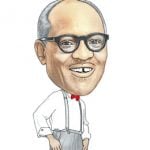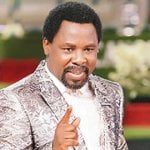Allegations of corruption, and other improprieties on the part of government operatives at all levels are mounting. Expending non-appropriated funds is a case in point. That all of these may catch the attention, and command the action of a new government is not unimaginable. Hence, the thought of the maxim, what is good for the Jonathanian goose cannot but be good for the Buharian gander,will resonate, and make the latter quirk at the prospect of losing power. The point is that the fear of the unknown, so defined, would hardly make a president Buhari willing to relinquish power. There is at any event, this entitlement syndrome around Mr. President that goes like this: ‘why should I rule for only one term, after having contested elections (and being rigged out three out of) four times? I deserve at least to be in office for eight years!’ That is why the Olusegun Obasanjo admonition, and that of many well-meaning others, on the president to resist the temptation of running for a second term couldn’t have cut an ice with the man of the moment.
In a recent social media commentary, I pointed attention to the unprecedented level of confidence,what the ‘Global Terrorism Index 2015’ refers to as ‘Fulani militants’ have enjoyed these past three years, in doing their acts across the country. A few days ago, the social media was awash with the absolutely provocative clip of those who allegedly massacred 17 church goes, including two catholic priests, in Benue, adorning themselves with the regalia of the dead, and practically dancing on their graves! The thoughts of what would come the way of Fulani herdsmen across the country in the event of loss of power by Buhari, in whose government the former have found so much acquiescence to impunity, must be of genuine concern to the president. It is not unthinkable that this concern may want to make him remain in office for as long as possible. It is the type of orientation that does not brook any desire or willingness to lose in the upcoming 2019 ‘war.’
Add to these the fact that tension in the land, substantially attributable to socio-economic pressures, is not only unspeakable, but growing. It is made much worse by suggestions from official spokespersons that things are indeed looking up, only that most Nigerians either do not seem to be smart enough to know, or choose to forget ‘where we are coming from,’ after 16 years of PDP. Opposition is being muzzled. The much hyped corruption fight has ended up being selective, defective, and discredited. Above all, there is the rising market value of extremism, with the middle ground shrinking fast! The evidence: the arguments for restructuring, once touted as the quick-win, is now sounding in the ears of many, like a broken record. In its place, an increasing number of Nigerians are calling to question the very basis of the country’s continued existence. Secessionist tendencies, once mentioned in hushed tones, are gaining traction across the land. There is evidence of retaliatory killing; and call to self defense is coming from very credible sources. These are being made very attractive by the growing suspicion that the security forces, as T.Y. Danjuma recently noted, are themselves hopelessly partisan.What we have seen the APC do in its ward elections across the country a few days ago, and in its candidate selection process in Ekiti State, is also enough food for thought in this regard.
What all of these suggest is that the 2019 ‘election’ is going to be, as pundits would say, one handshake that is bound to go beyond the elbow. I hope I am wrong, but something tells me, going by the evidence heretofore adduced, that this country may indeed unravel by reason of the next election. It is evident that come what may, the incumbent president will proclaim himself winner of the election. Recall that the man had often given vent to how shocked he was that his predecessor could so readily walk away from power as the latter did in 2015. To have President Muhammadu Buhari out, therefore, may just require a little more than getting PVCs ready to do their job. I shudder to think of what I call the Mohammed Morsi syndrome, about which I feel increasingly uncomfortable. This is the story of the first democratically elected president of Egypt, who unfortunately rather than focusing on core social issues that propelled him into power in the first instance, wantonly marginalised them; and instead prioritised political control and dominance. The rest is now history.
Yet, bad as things are in Nigeria today, and in spite of this gory spectacle painted heretofore, I hasten to add that it is still not too late in the day to pull our country back from the precipice; and this is the entire purpose of this piece. How? First, the Buhari presidency can be made much more inclusive going into its final year. For, the truth is, it is exclusion, the provincial predilection, and very limited capacity of Mr. President,that lie at the root of much of the tension currently soaking the land, sharpening long-standing fault lines around which the country is now threatening to fracture. Secondly, official spokespersons of government should level up with the people; talk fact, shun propaganda, and appreciate the right of people to complain and demand greater accountability. Thirdly, presidential leadership is needful in the quality of election campaigns to be conducted going forward.
These should be persuasive homilies, not intimidation and psychological warfare. Fourthly, selective prosecution of citizens across the land should stop forthwith. Fifthly, it is important for 2019 for the election management to do a good job in Ekiti and Osun states in the coming 2018 gubernatorial elections. Only this can imbue 2019 with the requisite credibility. The very controversial type of outing that INEC had in Ondo State in 2016 should not be repeated in these two states. Sixthly, the government has a duty to rapidly expand the social net for the most vulnerable in the country with a view to defusing the smouldering volcano and tinderbox. Above all, there should be a listening to the argument of the protagonists of restructuring.
- Professor Mimiko, mni, is of the Department of Political Science, Obafemi Awolowo University, Ile-Ife.






